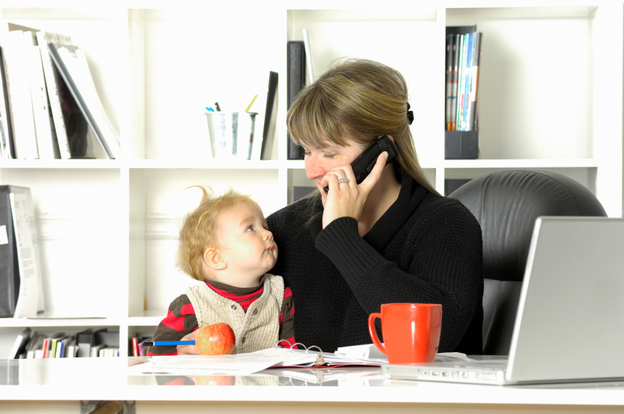SingaporeMotherhood | Parenting
July 2015
Work-Life Balance for New Mums!

Not all mothers have the privilege of enjoying an extended maternity leave, longer than the prescribed sixteen weeks. Financial constraints or the desire to simply want to return to the workforce and resume their pre-baby routines may impose a pressing need on new mothers to adjust their lifestyles. So, what aspects of the process of reintegrating herself into her workplace should a new mother be aware of? The journey will not exactly be a walk in the park, but it can most definitely be managed well if she educates herself prior to the ordeal. Mr David Ang, Director of Corporate Services at Human Capital Singapore, shares some tips for new mothers to strike that balance between work and life before and after baby arrives!
[banner][/banner]
Before Going On Maternity Leave
It is essential for an expectant mother to maintain good working relationships with her colleagues prior to going on maternity leave, more so if she is part of an SME (Small-Medium Enterprise). SMEs tend to be made of close-knit circles due to their relatively flat hierarchy, and this allows one to keep in touch with colleagues easily. If a temporary staff member is going to be filling in for you throughout the period of your absence, ensure that you done the necessary handing over of tasks before you leave. This will make for a smooth transition for you as well as your new colleague, giving you more time and peace of mind to fuss over all things related to the impending arrival of your bundle of joy.
Taking into consideration the preferences of your employer, mothers-to-be may also decide on whether or not they would like to opt for flexible work arrangements very close to their delivery date. This would also depend on your level of seniority in your firm and the nature of your job. Discuss such issues several months prior to your due date with your employer so that the required arrangements can be made as soon as possible, thus alleviating unnecessary tension.
Sorting Out Your Childcare Options
Should you wait till baby’s out to begin sourcing for childcare options? Most definitely not! This will only add extra stress to your postnatal anxieties. According to Mr Ang, deciding on the preferred mode of childcare when a new mother returns to work should be made a discussion point within the family months before the baby arrives. “Consider your financial situation and the ability of the grandparents to provide help. Grandparents play a very important role,” explains Mr Ang. Some grandparents might not be mentally or physically well prepared to render support for caring for the new baby. In this case, you might consider acquiring a domestic helper. Analyse the background of your potential domestic helper; consider her age as well as her childcare experience – it would be an added advantage if she were a mother herself.
If moving in with their parents seems like a feasible option for a pair of new parents, that could be embarked on. However, they should first take into consideration a few factors, such as the proximity of their parents’ home to their respective workplaces. If the new mother is an employee of a large organisation which offers in-house childcare facilities, she should make use of them as it would translate to more time spent with her little one, such as during lunch hour. Knowing that her child is in safe hands just a stone’s throw away would also allow her to concentrate on her work better, increasing productivity.
Back to The Office
Prior to reintegrating herself into the workplace after a long maternity break, a new mother has to be emotionally and psychologically prepared for the journey ahead. Possible uncertainty and anxiety can be eliminated by equipping herself with knowledge on what has changed at the office within the span of time for which she was away. A lack of confidence might result from certain changes at the workplace, such as a new, seemingly more competent counterpart. Holding a job for which the relevant skills can quickly become obsolete might mean that a new mother may have to attend a refresher course before resuming work. If your company provides any form of training, induction, or counselling for new mothers, make it a point to attend these so as to make your reintegration process smoother.
For new mothers whose jobs demand shift work, they should speak to their employer regarding a more comfortable working arrangement. Working the night shift would not be advisable as it would mean not being able to be active during the day when your child requires your attention. Try to switch shifts – to a permanent morning or afternoon shift instead. “Flexible work arrangements will allow mothers to integrate themselves back into the workforce,” says Mr Ang. Depending on the nature of the job, new mothers could be allowed to work on smaller projects first before becoming fully involved. It is important to voice out preferences to employers so that both parties can benefit from a favourable arrangement. Gradual integration is key in some cases.
Pumping Breast Milk At Work
For new mothers who are breastfeeding, pumping breast milk while at work could pose some amount of discomfort if there are no proper lactation facilities available. Once again, they should not be afraid to voice their concerns to their employer. If there are a substantial number of female employees in the firm who are of childbearing age, the management could possibly be willing to dedicate a small space in the office to the setting up of a lactation room. In the event that this is not a feasible choice for the company, mothers should examine other options. For instance, is there a childcare centre nearby the office? If so, permission could be sought from their employer as well as the management of the childcare centre to utilise their facilities at certain times.
No childcare centres nearby? Fret not. Many shopping malls these days have nursing rooms for breastfeeding mothers! Check on whether the nearest shopping mall has such facilities for your usage. Do be mindful of the fact that the proportion of male and female workers at your office will be a major deciding factor for the setting up of a lactation room. New mothers could face a slight loss of privacy when pumping breast milk at the workplace especially if it is a male-dominated environment. However, Mr Ang adds that they should also understand the constraints of the workplace and exercise discretion when the need to pump breast milk arises.
Support, Support and More Support!
In order for a new mother to truly be able to strike the right balance between work and the demands of motherhood, she needs a reliable support network. It all should start at home, of course. “Husbands must step in to render their help whenever necessary,” says Mr Ang. They can help out with the household chores, get the grocery shopping done or help to sterilise all of the baby’s things – anything that eases her workload. It is also crucial for a routine to be established when she returns to work. Domestic helpers or grandparents should be provided with very clear instructions on how to care for the baby and where all the essential items for the baby are kept in the household so as to avoid hiccups.
Prioritising is important on the part of the new mother herself. She should allocate a fixed period of time while at work to call back home to check on the situation of her little one so that her balance of mind is maintained and her productivity is not hampered. Keep in mind that workplace ethics count too – for example, if urgent leave is required, mothers should always remember to immediately inform their employers and also follow up with them or their replacement staff member thereafter. Asking for her employer to consider a reallocation of duties is also advised wherever possible.
“It is important for the new mother to know that she is not alone,” Mr Ang adds, explaining that motherhood is an extremely demanding change – physically, psychologically and emotionally. There are numerous support groups available on the various social media platforms, of which they can easily become a part of and exchange advice and tips with other new mothers. The current situation is very much different from that of past generations during which subjects such as breastfeeding were considered taboo.
Preparing for motherhood and the process of returning to the office post-maternity leave is ultimately a collective effort. The new mother, her husband, in-laws, parents, colleagues and even employer all play small yet vital roles in helping her to achieve work-life balance. It is of course encouraging to see that an increasing number of workplaces are becoming “new-mum friendly”!
All content from this article, including images, cannot be reproduced without credits or written permission from SingaporeMotherhood.
Follow us on Facebook, Instagram, and Telegram for the latest article and promotion updates.









